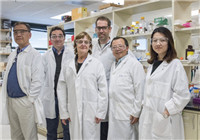
Hang Bo (L1) with his team members at Lawrence Berkeley National Laboratory of the United States. (Provided to Jiangsu Now.)
“It’s every scientist’s wish to transform and industrialize scientific achievements for the benefit of the people,” said Hang Bo, chief scientist at Lawrence Berkeley National Laboratory of the United States.
As one of the initiators of Jiangsu Nanjing-Lawrence Berkeley Life Science Center, he is among Jiangsu’s “Innovative and Entrepreneurial Talents”, as well as an invited council member of Biotechnology Association of Jiangsu. He is also a visiting professor with Nanjing Medical University and the president of a biotechnology company in Nanjing.
Hang is currently busy preparing his new cooperation project with Jiangsu, which is scheduled to be inaugurated in Nanjing Jiangbei New Area at the beginning of 2018. To commercialize and industrialize scientific achievements is the priority of this new project.
Born in Nanjing of Jiangsu province, Hang left Jiangsu for further education when he was 24 years old. After he got his PhD, he started to work in the national laboratory in the U.S. and later became the chief scientist in 2000. His main tasks then included research on environment and disease (tumor), as well as its application in the field of bio-medicine. He rose to fame in 2013, when he and his team found that third hand smoke could cause gene mutation. The new discovery instantly attracted the attention in academic circle as well as the media, and led to the passing of a bill to control third hand smoke pollution in California in April 2014. After decades of efforts, Huang Bo owns 11 patents and has published over 100 pieces of influential articles.

Even though he lives in America, he always cares about his hometown. “All that Jiangsu has passed on me are gracious and positive. No matter where I am, my love and concern are always with my hometown,” said the scientist. His action echos his words, when he accepted the offer of the municipal talent program in Nanjing and started a biotechnology company here in 2012. Together with Nanjing Bio-medical Valley, he propelled the establishing of Jiangsu Nanjing-Lawrence Berkeley Life Science Center in 2015, working on the clinical transformation and commercialization of two tumor-related projects.
“I can truly feel the industrialization of new and high technology accelerating in Jiangsu, thanks to favorable policies. The government has been making great efforts to readjust industrial structures, and to promote developments in high-tech areas like information technology, computer software, bio-medicine and new materials,” said Hang Bo to JiangsuNow.
“As for industrialization of cutting-edge technologies, Jiangsu is also pretty successful, which is reflected by the rising number of high-tech start-ups, especially in developed cities like Nanjing, Suzhou and Wuxi. Achievements in biomedical industrialization are also remarkable in such fields like detection of tumor genes, antibody, immunity, etc. I believe Jiangsu will become more international in the future. I will introduce more great projects to my hometown, enjoying the pride and happiness in between,” he added.






